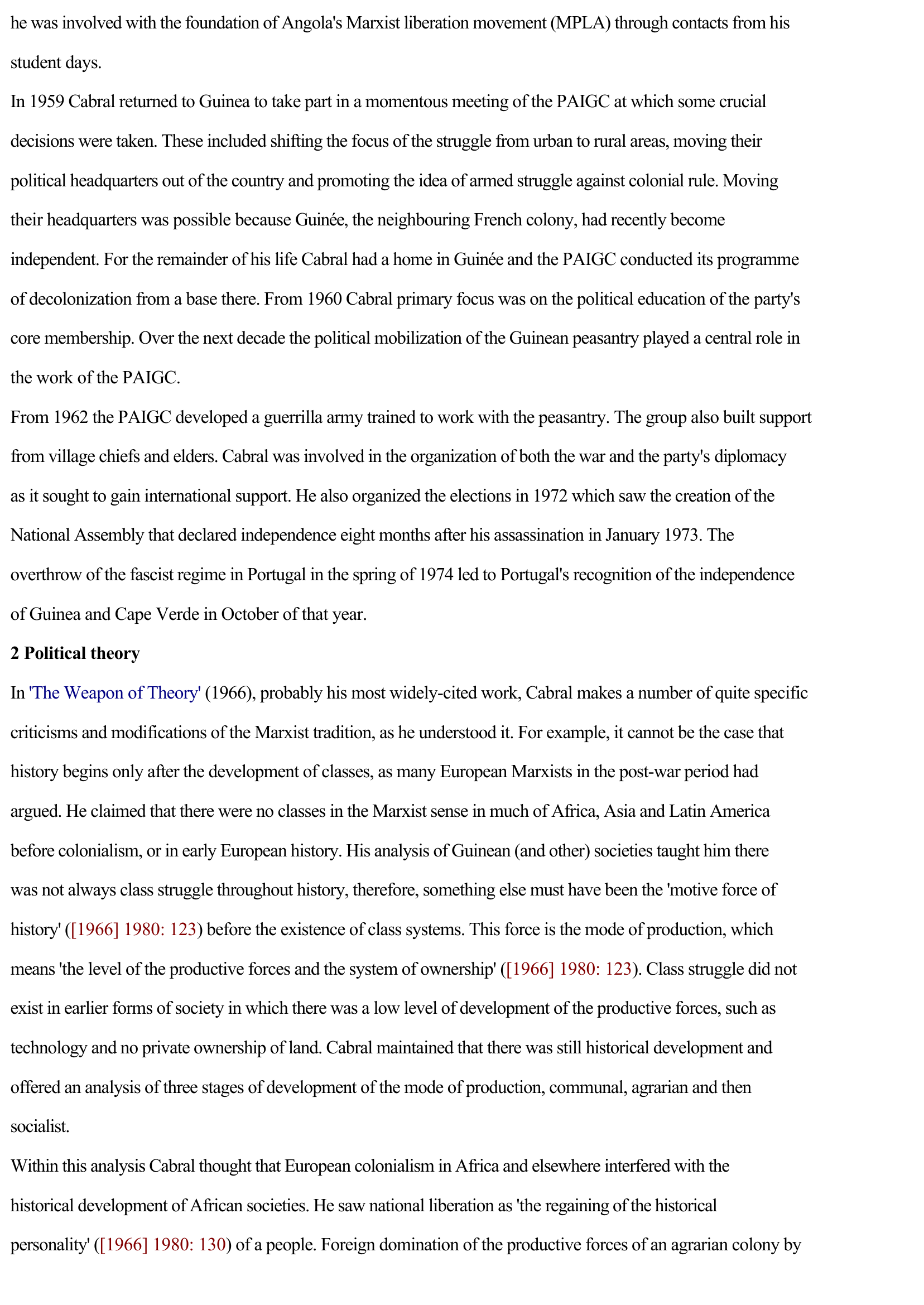Cabral, Amílcar
Publié le 25/02/2010
Extrait du document
Amílcar Cabral was founder and leader of the African Party for the Independence of Guinea and Cape Verde (PAIGC), which led a war of liberation in the Portuguese colonies of Guinea Bissau and Cape Verde that ended with the recognition of their joint independence by the Portuguese government in October 1974. Cabral was assassinated in 1973, the victim of an attempted coup aimed at taking over the PAIGC leadership. Thus he did not live to see the independence for which he had struggled. Cabral's importance for African political philosophy lies in his having developed an undogmatic left-wing analysis of the situation of the Guinean peasantry. While familiar with Marxist analysis, Cabral was always willing to adapt it to the empirical realities of the Guinean situation. His writings on the role of culture in the nationalist struggle, which have important affinities with Gramsci, combine theoretical ingenuity with detailed local knowledge.
«
he was involved with the foundation of Angola's Marxist liberation movement (MPLA) through contacts from his
student days.
In 1959 Cabral returned to Guinea to take part in a momentous meeting of the PAIGC at which some crucial
decisions were taken.
These included shifting the focus of the struggle from urban to rural areas, moving their
political headquarters out of the country and promoting the idea of armed struggle against colonial rule.
Moving
their headquarters was possible because Guinée , the neighbouring French colony, had recently become
independent.
For the remainder of his life Cabral had a home in Guinée and the PAIGC conducted its programme
of decolonization from a base there.
From 1960 Cabral primary focus was on the political education of the party's
core membership.
Over the next decade the political mobilization of the Guinean peasantry played a central role in
the work of the PAIGC.
From 1962 the PAIGC developed a guerrilla army trained to work with the peasantry.
The group also built support
from village chiefs and elders.
Cabral was involved in the organization of both the war and the party's diplomacy
as it sought to gain international support.
He also organized the elections in 1972 which saw the creation of the
National Assembly that declared independence eight months after his assassination in January 1973.
The
overthrow of the fascist regime in Portugal in the spring of 1974 led to Portugal's recognition of the independence
of Guinea and Cape Verde in October of that year.
2 Political theory
In 'The Weapon of Theory' (1966), probably his most widely-cited work, Cabral makes a number of quite specific
criticisms and modifications of the Marxist tradition, as he understood it.
For example, it cannot be the case that
history begins only after the development of classes, as many European Marxists in the post-war period had
argued.
He claimed that there were no classes in the Marxist sense in much of Africa, Asia and Latin America
before colonialism, or in early European history.
His analysis of Guinean (and other) societies taught him there
was not always class struggle throughout history, therefore, something else must have been the 'motive force of
history' ([1966] 1980: 123 ) before the existence of class systems.
This force is the mode of production, which
means 'the level of the productive forces and the system of ownership' ([1966] 1980: 123 ).
Class struggle did not
exist in earlier forms of society in which there was a low level of development of the productive forces, such as
technology and no private ownership of land.
Cabral maintained that there was still historical development and
offered an analysis of three stages of development of the mode of production, communal, agrarian and then
socialist.
Within this analysis Cabral thought that European colonialism in Africa and elsewhere interfered with the
historical development of African societies.
He saw national liberation as 'the regaining of the historical
personality' ([1966] 1980: 130 ) of a people.
Foreign domination of the productive forces of an agrarian colony by.
»
↓↓↓ APERÇU DU DOCUMENT ↓↓↓
Liens utiles
- Cabral (Amilcar) Homme politique guinéen (îles du Cap-Vert, v.
- Cabral, Pedro Álvares Cabral, Pedro Álvares (v.
- Cabral Amilcar
- Cabral, Amilcar
- Pedro Álvarez Cabral

































